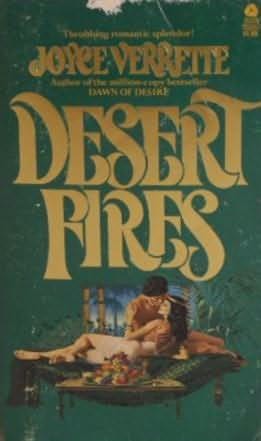Desert Fires
by Joyce Verrette

Reviewed by Coral
Passion and treachery collide in Ancient Egypt, as the country struggles to survive the Hyksos incursions. I'd go into more detail about the plot, but that was pretty much it. The book was supposed to be a romance, but the two couples I thought it would focus on were done and over with by the half-way point. What was left was an atrocious attempt at a historical story. If you told me that the author looked up a bunch of old sounding names and slapped them down on paper to write her story, I'd believe you, because she sure didn't do any research.
Let's start with the time setting of the story. So we have as Pharaoh of Egypt Amenemhet, and as his Queen, Nefrytaten. Based on his wife's name, it's clear that the Pharaoh was Amenemhet I, who ruled Egypt from 1991 - 1962 BCE. The Hyksos conquered Egypt more than 200 years later, taking the city of Avaris and using it as their capital (rather than the Egyptian capital of Thebes). So, when the characters talk of the Hyksos armies retreating to Avaris, that's a big mistake because it wasn't theirs yet.
The names the author chose to give the Hyksos rulers were equally ridiculous. Sargon was the name of an Akkadian king, as well as a later Assyrian king. Shalmanessar was the name of five different Assyrian kings. The Hyksos kings had names like Sa-kha-en-ra Shalik or Mer-woser-ra Yaqob-her. I mean, sure they're hard to write (and a lot harder to pronounce) but all the author had to do was use a shortened version or something.
The author writes that the Hyksos lived in a country named Zahi; historically they were a Semitic people who might have come from Canaan, so why didn't the author just use Canaan? This isn't the only instance of the author using a, more or less, uncommon name instead of a more mainstream name. She uses Aser instead of Osiris; Heru instead of Horus; and Tamera instead of Egypt. She could have at least used the name the ancient Egyptians had for their own country, Kemet. I have never heard of Heru or Aser or Tamera before her book, and I've done a lot of reading about ancient Egypt.
The stuff about Troy being an ally that the Hyksos and Egypt were vying for is pretty far-fetched, more so because the Hittite Empire lay between Troy and the disputed areas. There is even some evidence to suggest that Troy was an ally of the Hittites, maybe even a vassal state. Whichever it was, I really doubt they would have sent an army through the land of the Hittites to aid either side.
Okay, so moving away from the historical aspect of the book now, to concentrate on the style and characterization. There were too many characters with meaningless plots or roles. Sometimes I wasn't sure where the story was going, and I got the impression the author had lost her train of thought as well.
I hated how she had the Egyptians act like theirs was the perfect society and how all others were barbaric. Okay, that doesn't sound right, because I think a lot of places, then and now, have the belief that theirs is the right way and everyone else is wrong. It was like, behind the words she wrote, you could hear the author's voice saying that there was only one right way to do things, and it was the Egyptian way. Maybe I'm not explaining it right, but I don't think she should have been putting down either the Hyksos or the Trojans simply to elevate the Egyptians ahead of them. I think, throughout history, there have been many peoples, and painting all people of a nation as generically evil, does them a disservice. Actually, the concept of "purely good" versus "purely evil" is overdone in fiction. Some things are more complex, and I hate it when things are reduced to these basics.
Picky though it might be, I like it when authors try and use the titles that existed in the time their books were set it. Why use king instead of Pharaoh? Everyone knows what a Pharaoh is. Also, I like "nome" better than "province", and "nomarch" better than "provincial governor". As an aside, I seriously doubt a provincial governor would be sent off into foreign countries to be used as a spy. I think they had actual spies that did that sort of stuff.
Again with the sloppy editors. Published books really shouldn't have spelling mistakes in them. "Wandered" instead of "wondered" is a pretty stupid one to miss, too.
Grade: F